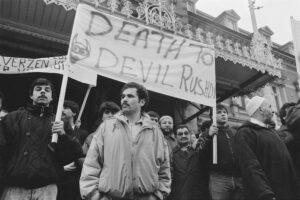Court ruling clears the way for possible Ariel Sharon visit
A war crimes case against Israeli Prime Minister Ariel Sharon alleging his complicity in the 1982 massacre of around 1,000 Palestinians in Beirut has been thrown out by a Belgian appeals court, opening a possible new window for an EU peace drive.
Ariel Sharon had shied from visiting Brussels for fear of legal complications ever since the case was launched last year. The EU, which has regarded the case as a distraction from the core issues, now hopes to focus its full energies on finding a path out of the escalating Israeli-Palestinian conflict, which may include informal talks in Brussels.
“We take note of this issue, but it is not central to the conflict in the Middle East,” David Harley, spokesman for European Parliament President Pat Cox, told me. “Mr Sharon remains the elected prime minister of Israel and we want to concentrate on all the elements necessary to resolve this conflict.”
The European Parliament had recently extended an informal invitation to besieged Palestinian President Yasser Arafat, but he was unable to leave his headquarters in Ramallah. Despite US President George W Bush's demand for new Palestinian leadership, Harley did not rule out extending the invitation to both leaders to hold talks in Brussels, but said the parliament was not yet entertaining such plans.
However, Harley noted that the EU was putting its weight behind the idea of an international peace conference –mediated by the so-called quartet of the EU, the United States, Russia and the United Nations – to help break the deadlock in the Middle East.
Off the hook
The Belgian appeals court said on Wednesday that Sharon could not be tried under an ambitious 1993 law which allows local courts to prosecute violations of the Geneva Convention wherever in the world they occur, because he was not in Belgium. “If a person is not found on the territory, we find it inadmissible,” the three judges said in their 22-page ruling.
The verdict drew sighs of relief from Israeli quarters and will undoubtedly ease the strained ties between the two countries. “We're very content with the ruling,” Haim Assaraf, first secretary at the Israeli mission in Brussels, said. “This is a very good chance to reinvigorate relations between Belgium and Israel.”
Lawyers representing 23 Palestinian survivors of the 1982 Sabra and Shatila massacre by Israeli-backed Lebanese Phalangist militiamen slammed the ruling. An Israeli inquiry at the time found the then defence minister, Ariel Sharon, mastermind of Israel's invasion of Lebanon, to bear indirect but personal responsibility for the atrocities.
Michael Verhaeghe, one of the lawyers representing the Palestinians, sounded a defiant note to reporters following the hearing. “We are not satisfied with this,” he said, vowing to push on with a supreme court appeal. International human rights groups joined the chorus of condemnation, expressing disapproval that this avenue for victims of atrocities had been shut.
The outcome of this case is likely to affect proceedings brought in Belgium against several other heads of state, including the Palestinian leader Yasser Arafat and Fidel Castro of Cuba.
_______
A version of this article appeared in the 27 June to 3 July 2002 edition of The European Voice.


